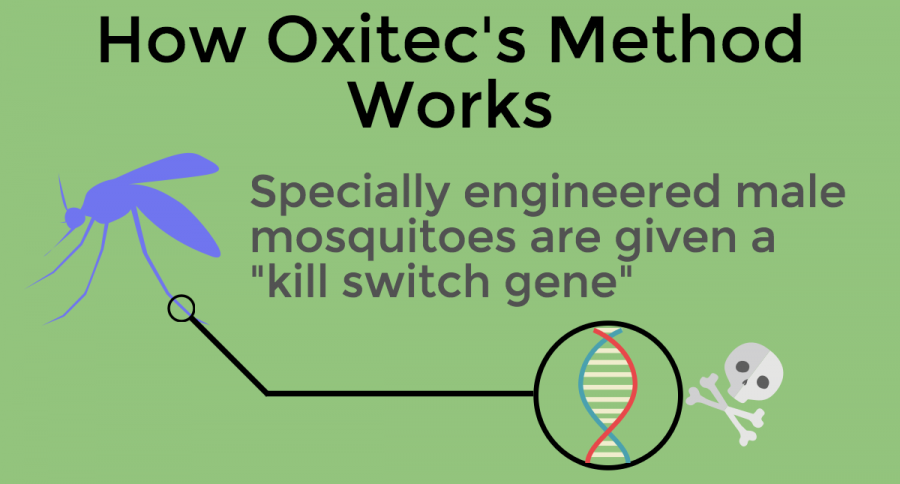Eradicating mosquitoes could come back to bite us
Free Stock Photos
Spread by mosquitoes, the Zika virus can cause severe fever, rash, joint pain and conjunctivitis. With the virus outbreak reaching epidemic levels in February, understanding Oxitec, a gene-based pesticide which has the potential to eradicate mosquitoes completely, is more important than ever.
February 18, 2016
The Zika virus made headlines last week for its oft-occurring but unproven link with microcephaly in infants. Transmitted by mosquitoes, Zika threatens tropical and subtropical countries as well as those who travel through them.
South American governments have worked to hinder the spread of Zika or mitigate its effects on newborns. Notably, El Salvador has advised women not to get pregnant until 2018 – a restrictive policy unlikely to succeed. But some scientists are working on a more novel approach.
Oxitec, a British biotechnology company, is researching an innovative technique to combat mosquito-transmitted diseases such as dengue, malaria, the West Nile virus: turning the mosquitoes against themselves.
The company is developing male mosquitoes which possess a “kill switch” gene: offspring which inherit this gene die before reaching maturity. These doctored mosquitoes would be released into indigenous mosquito populations to breed with them, causing the next generation of mosquitoes to die off.
Tests using Oxitec on sample mosquito populations have been overwhelmingly effective. A trial run in Piracicaba, Brazil “reduced wild mosquito larvae by 82 percent.” If widely employed, Oxitec’s technique could severely cripple mosquito populations and bring them to the brink of extinction.
Its success raises an interesting thought: if desired, humans could try to completely eradicate mosquitoes.
Mosquitoes and their myriad of diseases are widely feared and hated. It may seem like it could only benefit the human race to eliminate them. But such an impulsive decision might come back to bite us instead.
Bats, birds, fish and other animals feed on mosquitoes and their larvae. Eradicating mosquitoes would negatively impact all organisms which subsist on mosquitoes, thereby crippling food webs and decreasing fauna diversity.
Mosquitoes also play much more subtle roles in the environment. While moths and bees are more well-known, adult mosquitoes also feed on nectar and serve as pollinators for some plants. Mosquito larvae, which live in water, filter-feed, cleaning bodies of water of debris and bacteria.
We cannot unilaterally eliminate mosquitoes and expect the fallout to be self-contained. The eradication of mosquitoes would have a noticeable impact on global ecosystems.
Furthermore, some argue that mosquito-related diseases are not entirely bad; such diseases, and diseases in general, may have a role to play in preventing populations from reaching levels unsustainable by their environments.
For instance, as David Quammen notes, mosquitoes have “defended” areas like rainforests by making them uninhabitable to humans. If the pressure mosquitoes exert is removed, human and many other animal populations will lose a check on their growth.
Oxitec only intends to employ their technique in areas where mosquitoes are non-native species. I believe it is beneficial to eliminate mosquitoes in these areas. But we should be wary of the temptation to eliminate mosquitoes entirely.
Ultimately, the same arguments for conserving pandas, sharks or tigers can also be applied to mosquitoes. Although not endangered, mosquitoes play a role in the ecosystem, and by removing them, we disrupt and likely destroy global food chains from the bottom-up.



















![“[Building nerf blasters] became this outlet of creativity for me that hasn't been matched by anything else. The process [of] making a build complete to your desire is such a painstakingly difficult process, but I've had to learn from [the skills needed from] soldering to proper painting. There's so many different options for everything, if you think about it, it exists. The best part is [that] if it doesn't exist, you can build it yourself," Ishaan Parate said.](https://harkeraquila.com/wp-content/uploads/2022/08/DSC_8149-900x604.jpg)




![“When I came into high school, I was ready to be a follower. But DECA was a game changer for me. It helped me overcome my fear of public speaking, and it's played such a major role in who I've become today. To be able to successfully lead a chapter of 150 students, an officer team and be one of the upperclassmen I once really admired is something I'm [really] proud of,” Anvitha Tummala ('21) said.](https://harkeraquila.com/wp-content/uploads/2021/07/Screen-Shot-2021-07-25-at-9.50.05-AM-900x594.png)







![“I think getting up in the morning and having a sense of purpose [is exciting]. I think without a certain amount of drive, life is kind of obsolete and mundane, and I think having that every single day is what makes each day unique and kind of makes life exciting,” Neymika Jain (12) said.](https://harkeraquila.com/wp-content/uploads/2017/06/Screen-Shot-2017-06-03-at-4.54.16-PM.png)








![“My slogan is ‘slow feet, don’t eat, and I’m hungry.’ You need to run fast to get where you are–you aren't going to get those championships if you aren't fast,” Angel Cervantes (12) said. “I want to do well in school on my tests and in track and win championships for my team. I live by that, [and] I can do that anywhere: in the classroom or on the field.”](https://harkeraquila.com/wp-content/uploads/2018/06/DSC5146-900x601.jpg)
![“[Volleyball has] taught me how to fall correctly, and another thing it taught is that you don’t have to be the best at something to be good at it. If you just hit the ball in a smart way, then it still scores points and you’re good at it. You could be a background player and still make a much bigger impact on the team than you would think,” Anya Gert (’20) said.](https://harkeraquila.com/wp-content/uploads/2020/06/AnnaGert_JinTuan_HoHPhotoEdited-600x900.jpeg)

![“I'm not nearly there yet, but [my confidence has] definitely been getting better since I was pretty shy and timid coming into Harker my freshman year. I know that there's a lot of people that are really confident in what they do, and I really admire them. Everyone's so driven and that has really pushed me to kind of try to find my own place in high school and be more confident,” Alyssa Huang (’20) said.](https://harkeraquila.com/wp-content/uploads/2020/06/AlyssaHuang_EmilyChen_HoHPhoto-900x749.jpeg)







